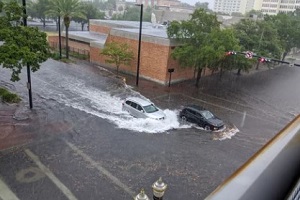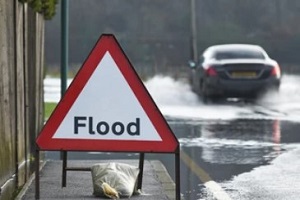 Flooding can be detrimental to businesses due to physical damage and social and economic losses. According to the Federal Emergency Management Agency (FEMA), over 40 percent of companies never reopen following this type of disaster, and of those that do, just 29 percent will operate after two years.
Flooding can be detrimental to businesses due to physical damage and social and economic losses. According to the Federal Emergency Management Agency (FEMA), over 40 percent of companies never reopen following this type of disaster, and of those that do, just 29 percent will operate after two years.
Many businesses carry flood insurance to protect against financial ruin caused by flooding. Flood insurance covers damage to commercial buildings and their contents. However, not all flood insurance is equal in terms of coverage, cost, and exclusions. Learn about the differences in flood insurance coverage for commercial properties.
What Does Flood Insurance Cover?
Commercial flood insurance is used to protect businesses from flood damage. Flood insurance is often purchased as a separate policy, as flood coverage is generally not included as part of a commercial property insurance policy. A commercial flood insurance policy may help cover repair or replacement costs if a commercial property suffers damage from floodwater.
Some of the most common assets covered by flood insurance include:
- Appliances
- Plumbing and electrical systems
- Water heaters and furnaces
- Permanently installed bookcases, cabinets, and paneling
- Permanently installed carpeting
- Windows
- Solar equipment
- Well tanks, fuel tanks, and pumps
- Staircases, foundation walls, and anchorage systems
- Detached garages
Flood insurance may also cover personal property, such as furniture and clothing, and other possessions like curtains, window air conditioners, and portable air conditioners. Some policies also cover valuable items, such as precious metals and currency.
It is important to remember that not all commercial flood insurance policies are the same. Business owners may discover that some policies cover certain types of commercial property that others do not. Business owners must consider what kind of coverage they need and the amount of coverage when selecting insurance.
What Is Not Covered by Flood Insurance?
 One area where many commercial flood insurance policies differ deals with exclusions. Business owners will often find that their policies list exclusions and limitations not covered by flood insurance. The National Flood Insurance Program (NFIP), which FEMA manages, outlines certain expenses that are generally not covered by standard flood insurance policies. These include:
One area where many commercial flood insurance policies differ deals with exclusions. Business owners will often find that their policies list exclusions and limitations not covered by flood insurance. The National Flood Insurance Program (NFIP), which FEMA manages, outlines certain expenses that are generally not covered by standard flood insurance policies. These include:
- Valuable papers
- Vehicles used for the business
- Financial losses from business interruption
The NFIP defines a flood as an excess of water on land that is normally dry. The water must affect at least two acres of land and at least two properties to be deemed an actual flood. For example, a business that experiences flood damage caused by a sump pump backup not related to flooding is not generally covered by flood insurance.
As exclusions and limitations listed on commercial flood insurance policies can greatly vary from one insurance provider to the next, business owners must compare different policies to find one that best meets their unique requirements.
When Is Flood Insurance Necessary?
Some business owners wonder if they really need flood insurance or if it is an unnecessary expense. It makes sense for business owners to purchase a commercial flood insurance policy if they have a business in a high-risk area.
However, flood insurance is for more than just businesses on land at high risk for flooding. According to FEMA, all 50 states have experienced flooding, and approximately 20 percent of claims handled come from low- to moderate-risk regions.
Business owners should also consider investing in a flood insurance policy if they operate a business in an area that experiences snowy, cold winters and warm springs. A leading cause of the flooding is quick melting snow as the weather warms up.
Businesses that run businesses in areas that experience moderate to heavy amounts of rainfall in the spring should also consider flood insurance. When rivers and streams overflow due to rainfall, the water can enter businesses and cause destruction.
What to Look for in a Flood Insurance Policy
 There are many aspects to consider when comparing commercial flood insurance policies. In addition to reviewing what is covered and what exclusions and limitations exist, business owners will also need to consider coverage limits.
There are many aspects to consider when comparing commercial flood insurance policies. In addition to reviewing what is covered and what exclusions and limitations exist, business owners will also need to consider coverage limits.
The amount of coverage that a business needs will depend on the size and structure of the building and the value of its contents. An experienced insurance agent can help determine how much coverage to buy.
Get a Quote for Flood Insurance Today
No business is completely safe from potential flooding; a flood’s impact can harm businesses for many years. Fortunately, flood insurance is available to help protect commercial property in a disaster.
The team of insurance experts at Atlas Insurance Agency is proud to provide businesses with the best coverage solutions based on their unique needs and budget. To learn more about differences in commercial flood insurance policies or to request an insurance quote, reach out to Atlas Insurance Agency at (808) 400-6680.
